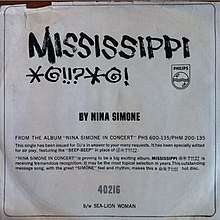Mississippi Goddam
| "Mississippi Goddam" | |
|---|---|
 The sleeve for the promo release of the single | |
| Song by Nina Simone | |
| from the album Nina Simone in Concert | |
| Released | 1964 |
| Recorded | New York City, live at Carnegie Hall |
| Label | Philips Records |
| Songwriter(s) | Nina Simone |
| Composer(s) | Nina Simone |
| Producer(s) | Hal Mooney |
"Mississippi Goddam" is a song written and performed by American singer and pianist Nina Simone, who later announced the anthem to be her "first civil rights song"[1]. It was released on her album Nina Simone in Concert in 1964, the album was based on recordings of three concerts she gave at Carnegie Hall in 1964. The album was her first release for the Dutch label Philips Records and is indicative of the more political turn her recorded music took during this period.
Simone composed "Mississippi Goddam" in less than an hour. Together with "Four Women" and "To Be Young, Gifted and Black", it is one of her most famous protest songs and self-written compositions.
Interpretation
The song captures Simone's response to the murder of Medgar Evers in Mississippi; and the 16th Street Baptist Church bombing in Birmingham, Alabama, killing four black children.[2] On the recording she cynically announces the song as "a show tune, but the show hasn't been written for it yet." The song begins jauntily, with a show tune feel, but demonstrates its political focus early on with its refrain "Alabama's got me so upset, Tennessee's made me lose my rest, and everybody knows about Mississippi goddam." In the song she says: "Keep on sayin' 'go slow'...to do things gradually would bring more tragedy. Why don't you see it? Why don't you feel it? I don't know, I don't know. You don't have to live next to me, just give me my equality! "
Reception
Simone first performed the song at the Village Gate nightclub in Greenwich Village, and shortly thereafter in March 1964 at Carnegie Hall, in front of a mostly white audience.[3] The Carnegie Hall recording was subsequently released as a single and became an anthem during the Civil Rights Movement.[4] "Mississippi Goddam" was banned in several Southern states, ostensibly because of the word "goddam" in the title.[5] Boxes of promotional singles sent to radio stations around the country were returned with each record cracked in half.[6]
Simone performed the song in front of 10,000 people at the end of the Selma to Montgomery marches when she and other black activists, including Sammy Davis Jr., James Baldwin and Harry Belafonte crossed police lines.[7]
See also
References
- ↑ Feldstein, Ruth (March 1, 2005). ""I Don't Trust You Anymore": Nina Simone, Culture, and Black Activism in the 1960s". Journal of American History: 1349 – via ignacio.
- ↑ Tillet, Salamishah (June 19, 2015). "Nina Simone's Time Is Now, Again". The New York Times. ISSN 0362-4331. Retrieved 2015-07-05.
- ↑ Pierpont, Claudia Roth (August 11, 2014). "A raised voice: How Nina Simone turned the movement into music". The New Yorker. Retrieved July 5, 2015.
- ↑ Nina Simone Reveals 'Mississippi Goddam' Song 'Hurt My Career'. Jet. March 24, 1986. p. 54.
- ↑ Smith, Ian K. (March 25, 2010). "Top 20 Political Songs: Mississippi Goddam – Nina Simone – 1964". New Statesman.
- ↑ Chandler, Adam (June 27, 2015). "How the Civil-Rights Era Made and Broke Nina Simone". The Atlantic. Retrieved July 5, 2015.
- ↑ May, Gary (March 20, 2015). "The Almost Forgotten Selma March". The Daily Beast. Retrieved July 5, 2015.